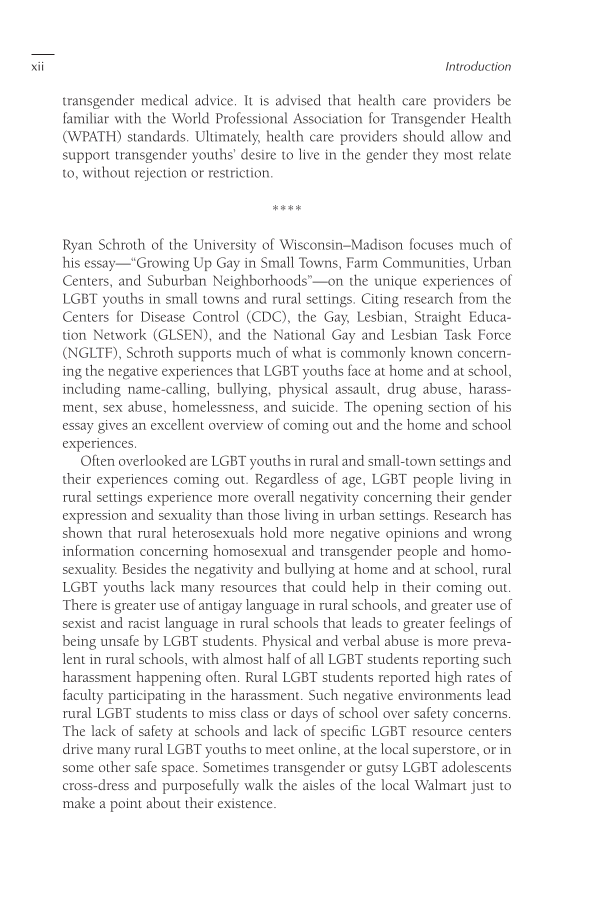xii Introduction transgender medical advice. It is advised that health care providers be familiar with the World Professional Association for Transgender Health (WPATH) standards. Ultimately, health care providers should allow and support transgender youths’ desire to live in the gender they most relate to, without rejection or restriction. **** Ryan Schroth of the University of Wisconsin–Madison focuses much of his essay—“Growing Up Gay in Small Towns, Farm Communities, Urban Centers, and Suburban Neighborhoods”—on the unique experiences of LGBT youths in small towns and rural settings. Citing research from the Centers for Disease Control (CDC), the Gay, Lesbian, Straight Educa- tion Network (GLSEN), and the National Gay and Lesbian Task Force (NGLTF), Schroth supports much of what is commonly known concern- ing the negative experiences that LGBT youths face at home and at school, including name-calling, bullying, physical assault, drug abuse, harass- ment, sex abuse, homelessness, and suicide. The opening section of his essay gives an excellent overview of coming out and the home and school experiences. Often overlooked are LGBT youths in rural and small-town settings and their experiences coming out. Regardless of age, LGBT people living in rural settings experience more overall negativity concerning their gender expression and sexuality than those living in urban settings. Research has shown that rural heterosexuals hold more negative opinions and wrong information concerning homosexual and transgender people and homo- sexuality. Besides the negativity and bullying at home and at school, rural LGBT youths lack many resources that could help in their coming out. There is greater use of antigay language in rural schools, and greater use of sexist and racist language in rural schools that leads to greater feelings of being unsafe by LGBT students. Physical and verbal abuse is more preva- lent in rural schools, with almost half of all LGBT students reporting such harassment happening often. Rural LGBT students reported high rates of faculty participating in the harassment. Such negative environments lead rural LGBT students to miss class or days of school over safety concerns. The lack of safety at schools and lack of specific LGBT resource centers drive many rural LGBT youths to meet online, at the local superstore, or in some other safe space. Sometimes transgender or gutsy LGBT adolescents cross-dress and purposefully walk the aisles of the local Walmart just to make a point about their existence.
Document Details My Account Print multiple pages
Print
You have printed 0 times in the last 24 hours.
Your print count will reset on at .
You may print 0 more time(s) before then.
You may print a maximum of 0 pages at a time.




































































































































































































































































































































































































































































































































































































































































































































































































































































































































































